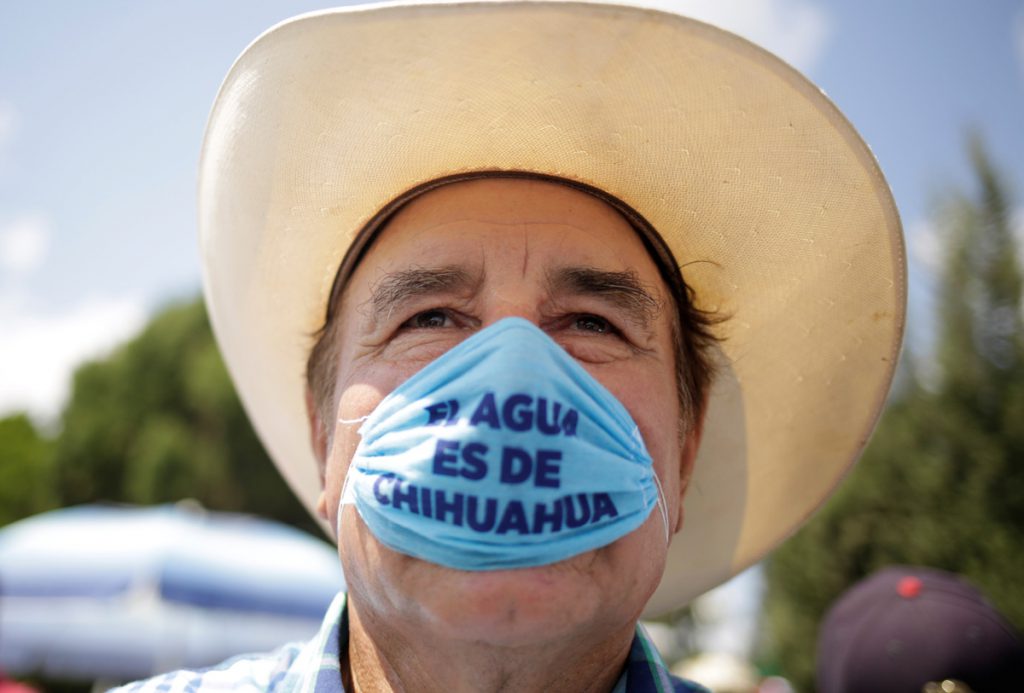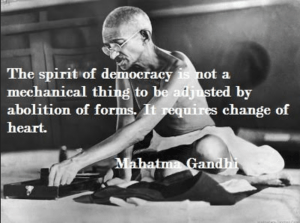Have you ever wondered what you would do without water? Water is indeed life. And without access to clean water, life’s hardships become further amplified. For many people in the US, water is a resource that they take for granted as it reliably flows through our fingers when we open a faucet in the kitchen or bathroom. Despite nearly 71% of the earth covered by water, large segments of people have little to no access to water. Recently, farmers in Chihuahua, Mexico, realized the precarious situation they found themselves in while enduring the drought at the same time that impending water payments were due because of a treaty with the United States that intended to promote water security in both countries. Mexican farmers faced with the harsh reality that they might not have water for their next harvest. The idea of this possibility prompted farmers and other citizens around the state to protest by blocking highways and showing up at dams. Tensions between the Mexican government and its constituents reached an all-time high when a protester was killed on September 8, 2020 by a Mexican national guard. So, how did the fight over water turn deadly?

To understand the severity of the issue, one must first go back to the ratification of the water treaty between the two countries. In 1944 The United States of America and Mexico signed the treaty “Utilization of Waters of the Colorado and Tijuana Rivers and of The Rio Grande”. This treaty was created to ensure the water security of both countries through the sending of water between each country.1 Every year the United States sends nearly 489 billion gallons of water from the Colorado River to their neighbor Mexico. Unfortunately, Chihuahua receives little to no water from this treaty. Most of the water sent by the United States is delivered to bordering states such as Nuevo Leon and Tamaulipas. Moreover, while they receive a small portion of the United States’ water payments, the state of Chihuahua sends more than half of the 114 billion gallons Mexico sends to the US each year. This has burdened the farmers of Chihuahua in recent years as they try to irrigate their own crops.2 Chihuahua is home to the biggest production of nuts and chilies in Mexico. In fact, Chihuahua produced 79,934 metric tons worth of pecans in 2015. This accounted for 65% of all pecan production in Mexico. when one considers that pecan trees require an estimated 34,000 gallons per year, it is easy to see why Chihuahua needs to retain as much water as they can in their dams for their farmers.3

Still, in 2020, Mexico fell behind in its payments to fulfill the requirements of the treaty of 1944. The country reportedly owes 345,600 acre-feet of water which is due by October 24th. This deficit accounts for 88% of what Mexico owes within the five-year quota. The President of Mexico, Andrés Manuel López Obrador, wants to make the payment and is relying heavily on Chihuahua to deliver most of that payment through its dams. As he sees it, it is in the best interest of the country to make the payment, since the United States sends more water to Mexico than Mexico sends back. The Mexican President also fears that President Trump will impose tariffs on Mexican products if Mexico fails to meet the requirements set forth by the treaty.4 However, Chihuahuan farmers know the effect the payment would have on their livelihoods. The transfer of the water Mexico owes to the United States would drastically decrease the water levels within Chihuahua, which would result in an exponential decrease in production as well. Fearing the future implications that the fulfillment of the treaty would have on their farms, Chihuahuan residents decided it was time to take a stand.5
Since the start of the year, Mexicans have been protesting the decision to pay for the treaty with Chihuahua’s limited water resources but the biggest protest came in September. In September, 2,000 farmers marched up to the dam name La Boquilla after hearing that the Mexican government had diverted increments of water to the United States instead of meeting the agreements it had with the farmers.6 Protesters were able to gain control of the dam when they overpowered law enforcement. As the news broke about the protest, the Mexican National Guard was deployed to La Boquilla Dam. Farmers first tried to dialogue and to preserve this resource, but they soon started feeling as though their needs were not being heard and escalating into violence. Confrontations between the two parties became more violent as farmers started setting fire on the dam’s infrastructure and damaging police vehicles in hopes that it would send a message to the government or gain more recognition from the media. Amidst all the commotion of the protest, a national guard shot and killed a woman protester and severely injured her significant other. Jessica Estrella Silva Zamarripa was the daughter of pecan farmers and the mother to three children. She was bravely fighting for her human right to water when she was killed. Her death shed a light on the issue of water distribution and has become a source of motivation from people all over Mexico.7

Meanwhile, President Andrès Manuel Lòpez Obrador attempted to downplay the protests and the severity of the issue. He went on record stating the protests had been staged by his political opposition.8 In a press conference, the President named 17 politicians who he says funded the fake protests. Andrès Manuel Lòpez Obrador has also attempted to gain more support from the Mexican population at large by stating he will request for the United Nations to complete a study to ensure that the United States is actually sending the amount of water that they say they are sending. Moreover, the President of Mexico assured his constituents that he will take matters into his own hands, saying he will personally appeal to the President of the United States to renegotiate the amount that Mexico owes or at least the terms by which that payment is made.9
With low rainfall and a large water debt payment looming, the Mexican government faced a dilemma. On one hand, the Mexican government wanted to keep good diplomatic ties with its neighboring country. Failure to make the payment could potentially result in sanctions on Mexican goods, which would affect more than the agricultural production of Chihuahua. On the other hand, if the payment of the water owed was made, President Andrès Manuel Lòpez Obrador could further alienate the people of Chihuahua. The transfer of the 345,600 acre-feet of water to the United States would leave Chihuahuans unable to water their crops for the following season. The President’s negligence regarding the issues provoked protests all over the State of Chihuahua against the violation of their human rights to preserving their water, their crops, and their lives.
Finally, on October 22, 2020, two days before the deadline for the water payment, Mexico and the United States reached an agreement that would account for the 345,600 acre-feet of water that was owed. The last-minute deal would hand over the rights of Mexico’s share of the water from the Amistad and Falcon dams to the United States. The terms of the agreement would reportedly spare Chihuahua with enough water for the next farming season. The deal would also implement “workgroups to analyze and develop water management tools to provide for increased reliability and predictability in Rio Grande water deliveries to users in the United States and Mexico”.10 While Mexico was able to fulfill the treaty requirements, it came at a huge cost to the country. Ultimately, the potential risk of water insecurity in the state of Chihuahua cost Mexico thousands of dollars worth of infrastructural damage plus the loss of life for one of its citizens, a young mother.
- “Utilization of Waters of the Colorado and Tijuana Rivers and of the Rio Grande” Accessed October 16, 2020, https://www.usbr.gov/lc/region/pao/pdfiles/mextrety.pdf. ↵
- Pamela Constable, “Mexican Farmers Occupy Dam to Stop Water Payments to the United States” Washington Post, https://www.washingtonpost.com/world/the_americas/us-mexico-water-dam-farm-protest/2020/09/13/dddb85e8-f3bb-11ea-999c-67ff7bf6a9d2_story.html, Accessed October 16, 2020. ↵
- Julio López-Díaz, “The Pecan Industry in Chihuahua Mexico: Challenges and Successes,” https://aces.nmsu.edu/ces/pecans/documents/9%20Lopez%20Diaz.pdf. ↵
- Mark Stevenson, “Mexico Struggles with U.S. Water Debt, Suggests U, N, Audit,” September 3, 2020, https://www.pbs.org/newshour/politics/mexico-struggles-with-u-s-water-debt-suggests-u-n-audit, Accessed October 16, 2020. ↵
- Pamela Constable, “Mexican Farmers Occupy Dam to Stop Water Payments to the United States” Washington Post, https://www.washingtonpost.com/world/the_americas/us-mexico-water-dam-farm-protest/2020/09/13/dddb85e8-f3bb-11ea-999c-67ff7bf6a9d2_story.html, Accessed October 16, 2020. ↵
- Mexico News Daily. “National Guard Backs off after Tear Gas Fails to Dislodge Chihuahua Farmers,” September 9, 2020. ↵
- Pamela Constable, “Mexican Farmers Occupy Dam to Stop Water Payments to the United States” Washington Post,https://www.washingtonpost.com/world/the_americas/us-mexico-water-dam-farm-protest/2020/09/13/dddb85e8-f3bb-11ea-999c-67ff7bf6a9d2_story.html, Accessed October 16, 2020. ↵
- Eoin, Wilson, “Mexico’s Water Crisis Heats up as Transfer to US Looms”, https://www.aljazeera.com/news/2020/10/8/mexico-water-crisis-heats-up-as-us-transfer-deadline-looms, Accessed November 2, 2020. ↵
- Patrick McDonnell, “Mexican Water Wars: Dam Seized, Troops Deployed, at Least One Killed in Protests about Sharing with US”, https://www.latimes.com/world-nation/story/2020-09-11/mexican-water-wars-dam-seized-troops-summoned-at-least-one-killed-in-dispute-about-water-sharing-with-u-s September 12, 2020. ↵
- Mark Stevenson, “Mexico Reaches Deal to Pay Water Debt to US”, https://abcnews.go.com/International/wireStory/mexico-reaches-deal-pay-water-debt-us-73768266, Accessed November 9, 2020. ↵



68 comments
Osondra Fournier-Colon
This article relates to Civic engagement in ways that the people of Chihuahua acted to protect their right to obtain water and the attention it brought to the issue. Although their efforts took a dark turn with violent action taken between both farmers and law enforcement, it led to an inspiration to people within Mexico. Protests are a popular way for issues to be confronted, especially when people view the ones instigating the issue as people out of touch with their cases.
Aaron Onofre
This is a great article, Andres. Not having access to water is huge deal and it’s great that this article shines a light on that issue. It seems that many people forget how not only you need water for drinking but rather you need for a multitude of other things. In this case these farmers needed to for their crops and which they were dependent on for their livelihood.
Yaniev Ibarra
Great article Andres! This article was an interesting read that highlights the importance of water as a basic necessity and the insecurity and disruption lack of water can have directly on individuals, communities, and countries. What took me by surprise was that the president downplayed the seriousness of the protests blaming opposing political candidates for staging fake protests, thankfully there has been temporary relief for the situation.
Joseph Frausto
This is a well constructed article that displays a true respect for the tenacity displayed by the protesting farmers in the way they stood behind their beliefs throughout their demonstrations. It shows that formal, legal methods of relaying public discourse can often fall short of what is needed in a given scenario. Protests and grassroots actions like those of the farmers are a necessary form of expression that allows marginalized communities to voice their concerns.
Rosa Inocencio
This is a very well-written and informative article, one of few articles that do address very important issues that happen every day but somehow many do not seem to know or pay close attention to it. It is very sad seeing how one citizen had to die due to just protesting for her and many others’ basic necessities, it should have never gotten to that point. Although the issue was fixed in the end, even now large areas in Mexico still struggle to have enough water, and other areas around the world do too, and I feel as if that issue needs to be more known and paid more attention to because today it is them and tomorrow it might be us. Great Article!
Victoria Dubois
This article was very eye opening for me, to see that issues that there is on the border. I live at the border and didn’t know much of this information before this amazing article that was written. The article explains to us the water insecurity and how the government can be corrupted. Andres Garcia did a wonderful job writing this article with the information and facts that are in this writing.
Maximillian Morise
I must give my congratulations to the author on this interesting article that goes over an issue that many Americans even close to the border are not aware of — water insecurity. This is a sad story of corruption, governmental abuse, and a lack of care for the well being of the general public. I as a Texas-born American was aware that AMLO was a very controversial president especially amongst my friends with dual-citizenship in both Mexico and the United States, but was not aware of this entire water crisis. By shedding light on this, my eyes have been opened to why there is so much controversy regarding his presidency and why so many Mexicans are unhappy with the policies and decision making of their government and their president. Thank you for this article and thank you for the time you have spent on showing us this issue.
Naya Harb
Water is the most important basic human need. Without water, humans will die. I loved learning about the treaty between the United States and Mexico. It is amazing to know that Mexico is getting help to overcome this crisis. Thank you for this wise and interesting article. It is really important to be aware of global crises. However, it is sad to know that some people around the world are fighting for water today and dying.
Elias Muniz
Hi Andres, I really liked this topic and the article. This was not something I had hear about before, so reading through it was really eye opening yet inspirational. I come from a Mexican American background so seeing people like me stand up for what they believe in and fighting for a good cause bring me joy and hope that we can keep doing the same in the future. Your inclusion of historical context is important as I believe knowing the background to an event can help paint a bigger picture and show other just how important the cause is.
Jonathan Flores
I thought that the author did a great job at bringing attention to a very problematic issue that not many people are aware of. I think that the author did a very notable job at bringing up how we, as Americans, take water, not only for granted, but don’t realize how important it is. In this way, the author centered their argument in a very effective manner and maintained the main idea of the work throughout the entire passage. One tiny piece of advice would be that, in my opinion, the addition of Spanish in the beginning of the title my deter some readers who might not think they will be able to understand.